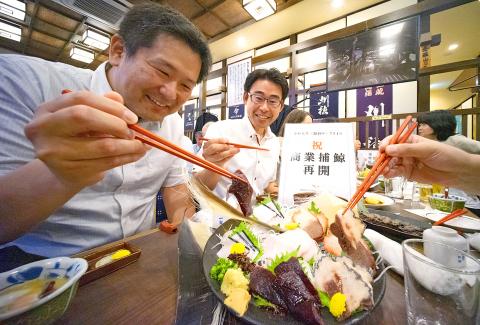“Two sashimis, three steaks,” cries the waitress at one of Tokyo’s most famous whale restaurants during a frantic lunchtime service, where Japan’s resumption of commercial whaling has cooked up new hope.
Mitsuo Tani has spent 46 of his 64 years preparing and cooking whale meat and hosts a mixed clientele at his restaurant: salarymen in white shirts gulping down a quick lunch before heading back to the office, single women, retired couples.
Whale steak is the most popular dish at US$9 — a thin rectangular piece of meat with as much rice, miso soup, vegetables and iced tea as the customer can eat. Also flying out of the kitchen is whale sashimi — raw slices of whale flesh, skin or liver.

Photo: EPA-EFE
Japan’s resumption of commercial whaling has prompted fury from other countries and campaigners, with activists saying that one of the three species targeted is threatened with extinction and sub-populations of the other two are depleted.
But veteran whale chef Tani is keen to promote the health benefits of whale meat.
“It is five times lower in calories than beef, 10 times lower in cholesterol, two times less fat than chicken. It’s packed with iron. But abroad, people do not know this,” he said.
Not all would agree with Tani’s health-based sales pitch, however. In 2015, when the Environmental Investigation Agency tested the mercury levels of whale meat sold in Japan, they found it riddled with the substance.
Whipping up a “whale roast beef” at the pass, Tani explained that he had to move from the northern city of Sendai after the 2011 tsunami and the price of whale meat soared amid a significant drop in supply.
In Tokyo, he has never had any problem procuring meat. While Japan was still part of the International Whaling Commission (IWC), the whales caught in Antarctic waters for “research” purposes still ended up as sashimi and steak on plates around the country.
Ironically, with Japan leaving the IWC and resuming commercial whaling off its own coast, the quantity of meat may decline.
Japan set an annual quota of more than 600 whales while in the IWC.
The cap now stands at 227 until the end of the year — 52 minke, 150 Bryde’s and 25 sei whales.
It is not the only country carrying out hunts, with Norway and Iceland conducting them in recent years and indigenous people from Alaska to Greenland allowed exemptions to the moratorium.
Hitting back at those who fear the resumption of commercial whaling further endangers whales, Japanese authorities say the quotas have been set carefully “to keep the whale population at a sustainable level.”
“I’m scared that the quantity of whale meat will go down,” admitted Tani.
‘WELL COOKED’
Another whale restaurant boss, Sumiko Koizumi, hailed the resumption of whaling as “an excellent thing” and said it was down to chefs to promote the meat and dream up new recipes.
Removing the stigma around whale meat will make it easier for consumers, she said, “first because supermarkets will be more inclined to offer it and wholesalers will listen more to our needs and be in a position to meet them.”
Kenta Yodono, sales manager at the Kyodo whaling firm that operates Japan’s flagship whaling boat, said the commercial hunts would catch different species of whales, which would taste slightly different.
“The commercial species will be different and certain people might be concerned that they will not have the same taste. But in general, I think the quality will improve and we can respond to restaurants’ needs,” Yodono said.
He acknowledged activists’ concerns over the cruelty of the whale hunt and said “the fishermen are conscious of the fact that the time the animal suffers should be reduced.”
However, Tani does have some fears over the immediate future of his industry, with few chefs training to acquire the specialized cooking skills required.
“With commercial whaling halted for more than 30 years, no one has got into the business and that will not happen overnight,” he said.
“Even if some people get into it now, it will take 30 years. And if they find the work too hard, they will stop. Whale needs to be well-cooked otherwise no one will start to eat it again,” added Tani.
Japan has defended the controversial whale hunt as a key part of its tradition and rich culinary heritage. And Tani agreed.
“A country that does not preserve its food culture has no future.”

June 9 to June 15 A photo of two men riding trendy high-wheel Penny-Farthing bicycles past a Qing Dynasty gate aptly captures the essence of Taipei in 1897 — a newly colonized city on the cusp of great change. The Japanese began making significant modifications to the cityscape in 1899, tearing down Qing-era structures, widening boulevards and installing Western-style infrastructure and buildings. The photographer, Minosuke Imamura, only spent a year in Taiwan as a cartographer for the governor-general’s office, but he left behind a treasure trove of 130 images showing life at the onset of Japanese rule, spanning July 1897 to

One of the most important gripes that Taiwanese have about the Democratic Progressive Party (DPP) is that it has failed to deliver concretely on higher wages, housing prices and other bread-and-butter issues. The parallel complaint is that the DPP cares only about glamor issues, such as removing markers of Chinese Nationalist Party (KMT) colonialism by renaming them, or what the KMT codes as “de-Sinification.” Once again, as a critical election looms, the DPP is presenting evidence for that charge. The KMT was quick to jump on the recent proposal of the Ministry of the Interior (MOI) to rename roads that symbolize

On the evening of June 1, Control Yuan Secretary-General Lee Chun-yi (李俊俋) apologized and resigned in disgrace. His crime was instructing his driver to use a Control Yuan vehicle to transport his dog to a pet grooming salon. The Control Yuan is the government branch that investigates, audits and impeaches government officials for, among other things, misuse of government funds, so his misuse of a government vehicle was highly inappropriate. If this story were told to anyone living in the golden era of swaggering gangsters, flashy nouveau riche businessmen, and corrupt “black gold” politics of the 1980s and 1990s, they would have laughed.

Imagine being able to visit a museum and examine up close thousand-year-old pottery, revel alone in jewelry from centuries past, or peer inside a Versace bag. Now London’s V&A has launched a revolutionary new exhibition space, where visitors can choose from some 250,000 objects, order something they want to spend time looking at and have it delivered to a room for a private viewing. Most museums have thousands of precious and historic items hidden away in their stores, which the public never gets to see or enjoy. But the V&A Storehouse, which opened on May 31 in a converted warehouse, has come up